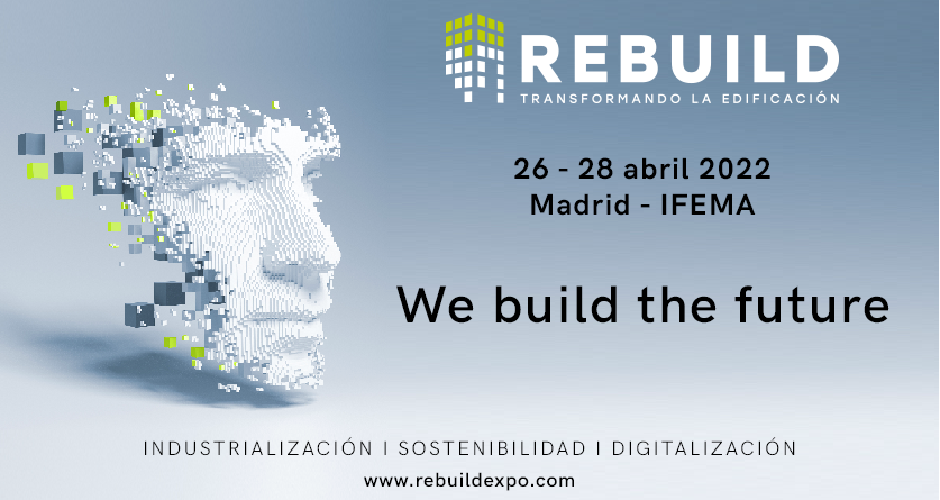Highlights of REBUILD 2022

Rebuild has once again been held in Ifema Madrid, which has already been established as a leading technological event in the building sector. The 5th edition was crucial to determine the future of construction, especially when taking into account the geopolitical situation and current economy.
REBUILD 2022 in numbers
This new edition of the National Congress of Advanced Architecture and Construction 4.0 has broken records in terms of participation. With a total of 17,344 participants, adding to the intervention of 581 experts from around the world to analyze the future of the sector and 372 exhibiting companies, the event made an economic impact of 37 million euros for the Spanish capital.
The main axes of this year's Rebuild were digitalization, sustainability and industrialization. Three levers to analyze and apply to the sector with the goal of gaining efficiency, competitiveness and ensuring a more responsible future. Following this pattern, some of the main themes have been the fight for the decarbonization of the sector, the use of technology as a boost for industrialization, digital trends and new business models.
The big challenge for sustainability
The sector is facing a major challenge in terms of sustainability, given that the current socioeconomic context is holding companies back from implementing an efficient and profitable energy model. However, the ecological transition is becoming imperative if we take into account the planet's climate evolution and the sustainable objectives that aim to correct it, such as the European Green Deal. As a result, regulations are emerging with the intention of taking action.
One of the main problems lies in the different levels of maturity of companies in terms of sustainability. Therefore, with the intention of helping companies to position themselves in this area, new ecological certifications are being developed.
In this edition, one of the most discussed topics has been the urgency to implement a decarbonized model based on the circular economy for the building industry. In reference to this problem, two axes are highlighted: the importance of recycling and the need for sustainable economic growth.
Two key terms: Industrialization and Digitalization
The conclusions of the event don’t leave any doubt that the future of construction is held up by these two concepts. Industrialization and digitalization not only reduce production time but also improve energy efficiency of the whole process. The industrialized method allows more control over the results from the early stages which later on decreases costs and emissions during the entire project cycle up until construction.
In fact, one of the major proposals is to use industrialization as a device for ecological transition. According to Diego Demaría, Sustainability Director of AEDAS Homes, industrialization allows a 60% reduction in CO2 emissions compared to traditional systems, 20% in water consumption and 17% in construction waste. Unfortunately, in Spain there is still a long way to go, as this system is only applied to around 1%. However, initiatives such as Build to Rent are emerging, a growing trend in the real estate sector that bases its production system on industrialized construction.
Lack of personnel, the subject pending
The construction industry is characterized as adult and masculine. 20% of workers will retire in the next five years leaving an important hole to fill. Also, thanks to the financial investment coming from the Next Generation funds to boost rehabilitation in terms of construction, 700,000 jobs are expected to be assigned by 2026.
Breaking the gender gap is another of the sector's challenges, since women account for only 10.1%, far behind other industries. Everything points to the fact that the most successful measures are to bet on digitalization, industrialization and training. Change the concept that construction is a rough, dangerous and forceful job and focus the future of the sector on a practical level based on technology. To this end, it will be very important to match regulated training with the needs of the new jobs being generated and that urgently need to be filled.
Conclusions
Generally speaking, we can say that Rebuild has become an important date for all professionals of the construction sector. An industry that is in constant evolution making an event of these characteristics quite necessary. From sharing points of view to showing the latest cases and novelties in innovation of the sector. The numbers of Rebuild 2022 speak for themselves. So we anxiously await next year’s edition, set for March 2023.
